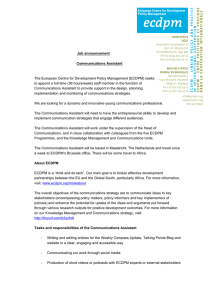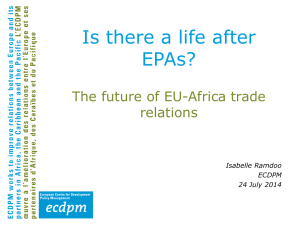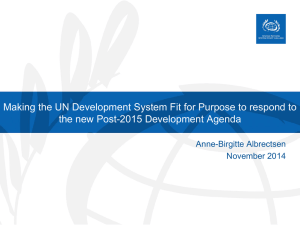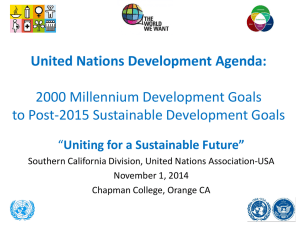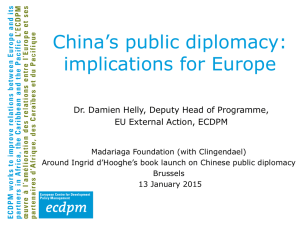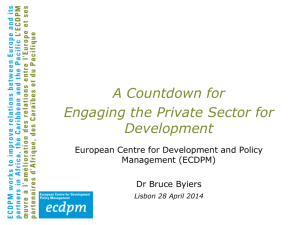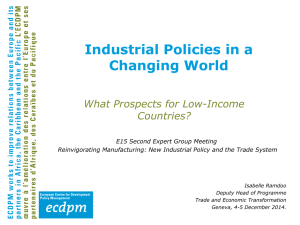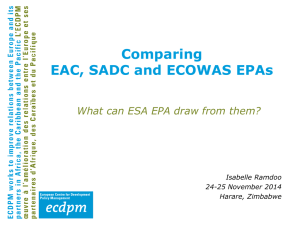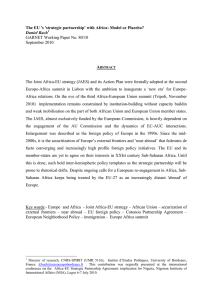publication
advertisement
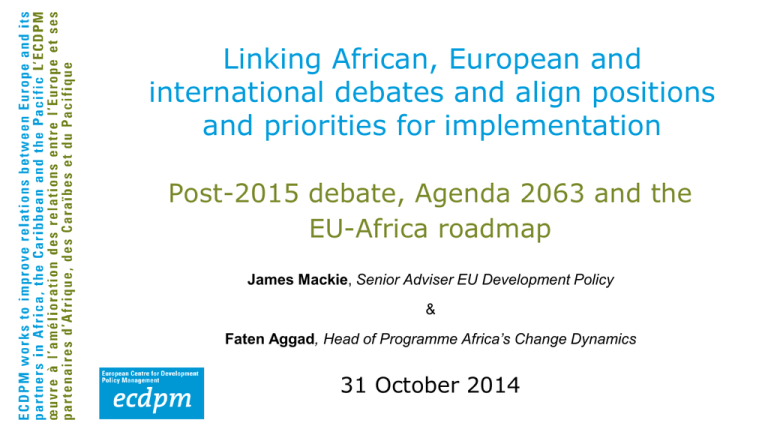
Linking African, European and international debates and align positions and priorities for implementation Post-2015 debate, Agenda 2063 and the EU-Africa roadmap James Mackie, Senior Adviser EU Development Policy & Faten Aggad, Head of Programme Africa’s Change Dynamics 31 October 2014 Content Process & Priorities Post-2015 debate Convergence? EU-Africa Roadmap 2014-2017, Agenda 2063 and the Post-2015 goals Financing The Pan African envelope Alternative sources of financing Post-2015 financing debate: Universality and Differentiation In Conclusion: Medium-term perspectives in the EU ECDPM The Post -2015 Debate Towards a Post-3015 Development Agenda: A Complex process… ECDPM Three key moments in 2015 Financing for Development Summit in Addis (July 2015) Will conference facilitate agreement on goals in September 2015? Financing discussions likely to focus on LDCs and fragile states Interests of MICs will also be important UN General Assembly (September 2015) Agree goals and targets Climate negotiations in Paris in 2015 (December 2015) Adopt new international climate change agreement that will cover all countries Protocol, another legal instrument or 'an agreed outcome with legal force’ Ideally pplicable to all Parties. ECDPM SDG Open Working Group (OWG) & UNGA 69 ● Proposed SDGs: 17 goals + 169 targets UN Member State negotiations: Sept. 2014 - Sept. 2015 will lead to agreement on a new framework to be implemented Jan. 1st 2016 ● 30 OWG constituencies (70 governments incl: 11 AU MS + 13 EU MS) supported Outcome Document ● G77 pushed for adoption of the document by the UNGA ECDPM 69th UN General Assembly ● Discussion around 17 goals ● SG Report (November) will acknowledge OWG outcome Likely to endorse goals with additions and recommendations (Means of Implementation discussion; negotiation process etc.) Discussions all about positioning topics – Still unclear if number of goals will be reduced Example Goal 16: Included: ‘Peaceful societies’ and ‘Access to Justice’ Excluded: ‘Rule of Law’ and target ‘Freedom of the Media’ ECDPM Different Interest Groups… ● LDCs: Strong emphasis on poverty reduction (through inclusive growth) Financing for development In Climate discussions focus on adaptation finance but demand more mitigation action and responsibilities also from emerging powers ● g7+: Focus on meaningful goal and targets on peaceful societies ● MICs: Equity and CBDR (with more responsibilities for developed countries) National sovereignty Reform of global governance for more inclusive decision-making Goals proposed by OWG ECDPM 1. End poverty 2. Achieve food security and improved nutrition 3. Ensure healthy lives and well-being 4. Inclusive and equitable education 5. Gender equality and empower women and girls 6. Availability of water & sanitation 7. Affordable, reliable & sustainable energy 8. Inclusive & sustainable growth 9. Resilient infrastructure, inclusive industrialisation 10. Reduce inequality within & among countries 11. Make cities inclusive, safe, resilient & sustainable 12. Sustainable consumption & production 13. Urgent action to combat climate change 14. Sustainable use of oceans, seas & marine resources 15. Sustainable use of terrestrial ecosystems 16. Peaceful & inclusive societies, justice for all, inclusive institutions 17. Strengthen finance, Means of Implementation, global partnership & PCSD Positioning of proposed SDGs: ECDPM Post-2015 Accountability Framework ● Shortcomings of MDG accountability Duplication, incoherence, no clear responsibilities Lack of ownership in some areas ● Discussions on post-2015 accountability in infancy still but need for a coherent framework Role of Review Mechanism of HL Political Forum Clearer lines of reporting (among all stakeholders) Data revolution Where does the EU Stand? ● High level of interest & strong commitment to MDGs ● Push for a common EU position by Commission (DEVCO+ENV) • A Decent Life for All – 2 June 2014 [COM 335] • Earlier policy papers in February & December 2013 • Forthcoming EU Council Conclusions (December 2014) ● The EU and MS supported the adoption of the OWG proposals • Now discussing implications with ministries • Also considering how to possibly implement at national level ● Outstanding challenges • Goals & targets – some differences over coverage vs. number • e.g. NL in favour of current goals while UK wants to reduce the number of goals • Global partnership – Finance and other Means of Implementation • Universality and differentiation Common African Position and the OWG Largely a case of convergence Common African Position’s 6 Pillars OWG report integrated all CAP priorities ECDPM The JAES and Post-2015 EU-Africa Roadmap Priorities (2014-2017) . 1. Peace & Security 2. Democracy, Good Governance & HR 3. Human development 4. Sustainable & inclusive development, growth & continental integration 5. Global & emerging issues ECDPM In pursuit of the same objectives? 1. End poverty - JAES Priority 3 2. Achieve food security and improved nutrition – JAES 4 3. Ensure healthy lives and well-being – JAES 3 4. Inclusive and equitable education - JAES 3 5. Gender equality and empower women and girls – JAES 2 6. Availability of water & sanitation – JAES 3 7. Affordable, reliable & sustainable energy – JAES 3 8. Inclusive & sustainable growth – JAES 1 & 4 9. Resilient infrastructure, inclusive industrialisation – 4&5 10.Reduce inequality within & among countries – JAES 4 11.Make cities inclusive, safe, resilient & sustainable – 3 & 4 12.Sustainable consumption & production - JAES 3, 4 & 5 13.Urgent action to combat climate change – JAES 3 & 5 14.Sustainable use of oceans, seas & marine resources 4&5 15.Sustainable use of terrestrial ecosystems – JAES 5 16.Peaceful & inclusive societies, justice for all, inclusive institutions – JAES 1 & 2 17.Strengthen finance, MoI, global partnership & PCSD –5 Convergence or divergence? Agenda 2063, JAES and Post-2015 ECDPM Financing EU allocation: The Pan-African envelope ECDPM African Discussions on Financing ● On-going debate on alternative sources of financing to finance continental development programs (i.e P&S, infrastructure, etc.): • • • • Obasanjo Report Mbeki Report on illicit financial flows Assessments by UNECA & NPCA & AfDB 9th African Development Forum, Marrakesh, October 2014 ● Some instruments already established • Africa 50 Fund (Infrastructure), • African Solidarity Fund (P&S) ECDPM Post-2015: The Financing Debate ● UN Financing for Development Conference, Addis Ababa, July 2015 ● Past experience - MDGs became very focused on ODA Financing gap notion – Jeffrey Sachs But have to think ‘Beyond Aid’ (ERD2013) ● There are a lot other types of finance: Domestic resources Domestic capital Foreign direct investment Remittances South-South cooperation ● Finance cannot solve everything Policies important – national & international How to make most effective use of finance? ● So need to discuss: Finance and other Means of Implementation Trends in development finance (2011 US$Bn) All developing countries ECDPM Low Income Countries Source: ERD2014 (forthcoming) Financial flows by income level (% of GDP) ECDPM Source: ERD2014 (forthcoming) Post-2015: Universality and Differentiation ● Post-2015 targets defined as aspirational global targets, with each government Setting its own national targets Guided by the global level of ambition But taking into account national circumstances ● Translation of universal goals/targets into National actions, commitments and responsibilities Big challenge ● Need to find a balance for all parties between National adaptation vs. global ambition “Fair” commitments and responsibilities ECDPM Post-2015: Universality and Differentiation ● Will be difficult to find political agreement on framework if differentiated responsibilities not adequately addressed ● OECD and G77 – differences over differentiated responsibilities in changing geopolitical landscape EU will have to translate targets to commitments, including in areas such as consumption/production and food waste Will emerging economies and MICs in Africa take on increased responsibilities ? ECDPM Will developed countries need to take the lead ? EU–Africa trade agenda: convergence or divergence ● Economic Partnership Agreements: • • • Objectives: promote regional integration & help integrate in global economy Signed: 2 full regions (ECOWAS+EAC) + some countries not N Africa Challenges for regional integration (i) some regions are split; (ii) complicated trade regimes with EU; (iii) makes intraregional trade more difficult ● TTIP - Transatlantic Trade & Investment Partnership (EU+USA) • WTO deadlock: big players want to reshape global trade as globalisation deepens • • Strategic interest: rise of China as a new leader in global trade EU+USA seek to join forces to maintain access to key markets ● Impact on EU-Africa relations (just as first EPAs concluded) • Erosion of preferences & new standards might apply to African countries In Conclusion: Medium-term perspectives in EU In light of post-2015 agreements, EU likely to: ● Review Agenda for Change ? ● Formulate proposals for post-Cotonou - including: Focus ODA support to LDCs, fragile and vulnerable states Partnership arrangements with LMICs ? Aid for Trade package ? Acquis of Cotonou (joint mgmt, essential elements?) Seek to align with Values from Lisbon Treaty ● Improve coordination: EU & bilateral programmes Take joint programming further ? Thank you Faten Aggad fa@ecdpm.org James Mackie jm@ecdpm.org www.ecdpm.org www.slideshare.net/ecdpm
